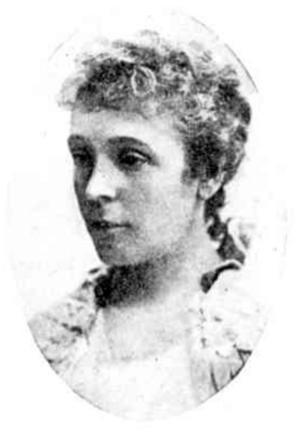Annette Bear-Crawford facts for kids
Annette Bear-Crawford (born in 1853 – died June 7, 1899) was an important leader for women's rights in Victoria, Australia. She worked hard to help women get the right to vote, and she also supported the idea of Australia becoming one united country.
Contents
Early Life and Education
Annette Bear-Crawford was born in East Melbourne, Australia. Her family was well-off, and she spent her childhood both in Australia and England. She had three brothers and five sisters. Her father believed that his daughters should have the best education possible. Annette was taught by private teachers in Australia and England before she went to Cheltenham Ladies' College in England.
After studying in France and Germany, she trained in social work in England. This meant she learned how to help people in need, especially in poorer areas of cities. She also met many leaders of the women's movement and became known for her active work with an organization called the National Vigilance Association, which aimed to improve society.
Fighting for Women's Right to Vote
In April 1890, Annette Bear-Crawford returned to Victoria, Australia. She quickly became a key leader in the growing movement for women's rights. At this time, the main goal was for women to gain the "franchise," which means the right to vote.
Annette strongly believed that if women could vote, it would be the best way to make their lives better. She used her excellent organizing skills to bring together different groups that were already working for women's right to vote. With help from the Woman's Christian Temperance Union (WCTU), she started the Victorian Women's Suffrage (Franchise) League.
Later, she helped create the United Council for Women's Suffrage in 1894. This council included representatives from many organizations that supported women's voting rights. Annette was the first president of this council. The council worked hard to talk to politicians and local government leaders. They even organized a huge petition asking for women's suffrage. However, they could not convince the lawmakers to pass a bill that would give women the right to vote at that time.
Annette Bear-Crawford also helped prepare women for public roles. She was a very good and clear speaker, and she taught other women how to speak in public. For example, Vida Goldstein, another famous women's rights activist, learned from Annette how to handle difficult questions and people who tried to interrupt meetings. Annette often spoke at WCTU and suffrage meetings. She also encouraged women to run for positions on school boards.
She helped make changes to laws that affected women, such as raising the age of consent to sixteen. She also pushed for women to be hired as factory inspectors and to serve on important committees. Annette saw the need for women police officers and women to help manage laws protecting babies. She was also one of the first members of groups like the Society for Prevention of Cruelty to Children.
One of her most lasting achievements was helping to start the Queen Victoria Hospital for Women in Melbourne. She was worried about unmarried mothers and their children. In 1897, she organized a successful fundraising campaign called the "Queen's Willing Shilling" to start the hospital. Sadly, she passed away before the hospital officially opened.
Personal Life and Legacy
In 1894, when she was 41, Annette married William Crawford, a lawyer who was nine years younger than her. After her marriage, she became known as Mrs. Bear-Crawford. Her marriage made her happy, but it did not slow down her important work.
Annette was described as a kind, smart, and loving person. She enjoyed reading and had a cheerful nature. As a strong supporter of women's rights, she truly believed that women should be equal to men. A newspaper once reported that she said, "most things worth having were originally produced by women. Man, she said, is destructive, while woman is constructive." This showed her strong belief in women's abilities.
In November 1898, Annette Bear-Crawford traveled to England to attend the Women's International Conference. Her husband joined her in London. She sadly died of pneumonia on June 7, 1899, at the age of 46.
A memorial service was held for her in St Paul's Cathedral in Melbourne. In 1902, a statue was put up in London to honor her memory. Her friends in England also placed a bronze plaque on the wall of Christ Church, South Yarra, to remember her work in both England and Australia. In 2007, Annette Bear-Crawford was recognized on the Victorian Honour Roll of Women for her amazing contributions.
See also
 In Spanish: Annette Bear-Crawford para niños
In Spanish: Annette Bear-Crawford para niños
 | Georgia Louise Harris Brown |
 | Julian Abele |
 | Norma Merrick Sklarek |
 | William Sidney Pittman |


